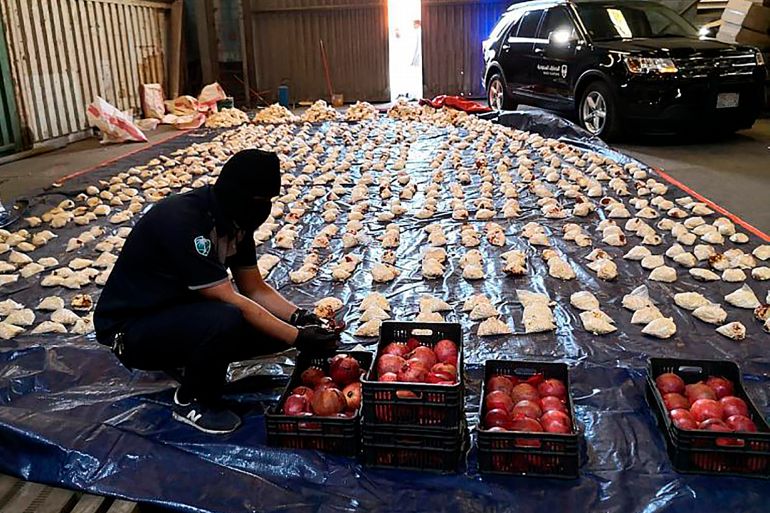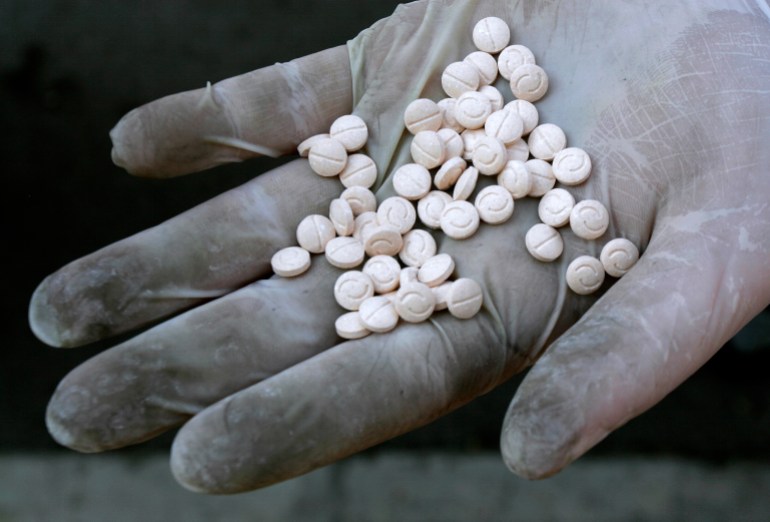What is Captagon, the addictive drug mass-produced in Syria?
The drug, often smuggled to Gulf states, has been a key topic in discussions over Syria’s re-entry to the Arab League.

Captagon has featured large in regional diplomatic discussions as some Arab countries look to normalise relations with Syria.
The addictive, amphetamine-type stimulant mass-produced in Syria and smuggled to the Gulf states seemed to be a bargaining chip for President Bashar al-Assad in talks on reinstating Syria’s Arab League membership as nations looked to curb the illicit drug trade.
Keep reading
list of 4 itemsWest Africa’s Sahel becoming a drug trafficking corridor, UN warns
Behind India’s Manipur conflict: A tale of drugs, armed groups and politics
Why are some countries decriminalising drugs?
At a May 1 meeting of Arab foreign ministers in Amman, Damascus agreed to cooperate with Jordan and Iraq to identify sources of drug production and smuggling, according to a statement from Jordan’s foreign ministry.
A week later, a high-profile Syrian drug smuggler and his family were killed in an air raid attributed to Jordan in southern Syria.
Here is what you need to know about the drug and why it has been so important recently:
Where was Captagon invented?
Captagon was the brand name of a psychoactive medicine produced in the 1960s by the German company Degussa Pharma Gruppe. It was mainly prescribed as a treatment for attention deficit disorder, narcolepsy and as a central nervous system stimulant.
Captagon tablets contained fenetylline, a synthetic drug of the phenethylamine family to which amphetamine also belongs.
In 1986, fenetylline was included in Schedule II of the United Nations Convention on Psychotropic Substances 1971, and most countries discontinued the use of Captagon. The International Narcotics Control Board said in 2011 that no country had produced fenetylline since 2009.
But production didn’t really stop, did it?
As official production ceased, some of the remaining stocks were smuggled out of Eastern Europe, in particular Bulgaria, to the Middle East.
Eventually, new counterfeit tablets labelled Captagon were produced in the 1990s to early 2000s in Bulgaria, according to a 2018 report by the European Monitoring Centre for Drugs and Drugs Addiction. The drugs were then smuggled out of the country by Balkan and Turkish criminal networks to the Arabian Peninsula.
Strict crackdowns on production by Turkish and Bulgarian authorities, which included the closure of 18 mostly large-scale laboratories involved in amphetamine synthesis, resulted in a drastic reduction in trade from the Balkans.

Why is Syria now making so much Captagon?
In 2011, after a brutal government crackdown on anti-Assad protesters, Syria descended into civil war. Internationally isolated and racked by fighting, the country was plunged into an economic crisis.
Although Damascus denies any involvement in the trade, observers say production and smuggling of the drug have brought in billions of dollars for al-Assad, his associates and allies as they looked for an economic lifeline.
According to a New Lines Institute report, the Syrian government uses “local alliance structures with other armed groups such as Hezbollah for technical and logistical support in Captagon production and trafficking”.
Experts say most of global Captagon production is now in Syria, with the wealthy Gulf states as the primary destination.
What are Jordan and Gulf states doing about it?
Since last year, countries that had large amounts of Captagon pass through their borders have ramped up efforts to stem the flow from Syria.
In February 2022, Jordan’s army said it had killed 30 smugglers since the start of the year and foiled attempts to smuggle 16 million Captagon pills into the kingdom from Syria – surpassing the entire volume seized throughout 2021.
In late August 2022, Saudi authorities made their largest seizure as they uncovered 46 million amphetamine pills that were being smuggled hidden in a shipment of flour.
A spokesperson for the Suadi General Directorate of Narcotics Control said it was the “biggest operation of its kind to smuggle this amount of narcotics into the Kingdom of Saudi Arabia in one operation”.
In February 2023, a man was arrested at Abu Dhabi airport in the United Arab Emirates after he tried to smuggle 4.5 million Captagon tablets in cans of green beans.
What is the rest of the world doing?
Although the drug is relatively unknown outside of the Middle East, countries like the United Kingdom and the United States have raised concerns over its production in Syria.
Both countries imposed new sanctions on Syrians connected to the trade this year. A UK government statement said 80 percent of the world’s Captagon is produced in Syria and is a “financial lifeline” for al-Assad’s regime “worth approximately 3 times the combined trade of the Mexican cartels”.
It also stated that Hezbollah and other Iranian-backed militia facilitate the industry “and in doing so fuel regional instability and creating a growing addiction crisis across the region”.
In December 2022, the US also introduced The Captagon Act, which mandates US agencies to target the illicit trade amid fears that the drug could appear on US shores.
How did Captagon get Syria back into the Arab League?
Arab League members’ desire to stop Captagon production and trade out of Syria appears to have been a crucial bargaining chip for Damascus.
A Jordanian official at the Arab foreign ministers’ meeting on May 1 said Syria would need to show it is serious about reaching a political solution because this would be a condition to lobby for the lifting of Western sanctions, a crucial step for funding reconstruction in Syria.
Saudi Arabia, which remains the biggest market for the drug, also sought assurances as it discussed the normalisation of ties with Damascus.
The kingdom supported rebel groups fighting government forces in the early years of the war. But, more recently, it has shown a desire to soften relations as part of a wider shift in regional diplomacy, including a rapprochement with Iran.
After the meeting in Amman, the foreign ministers of Egypt, Iraq, Jordan, Saudi Arabia and Syria said Damascus had agreed to “take the necessary steps to end smuggling on the borders with Jordan and Iraq”.
So who was the drug kingpin killed in Syria?
Foreign ministers from the 22-nation Arab League voted on Sunday for Syria’s return at a meeting in Cairo.
Just a day later, Marai al-Ramthan, a suspected Syrian drug smuggler, and his family were killed in an air raid in southern Syria, an attack attributed to Jordan, according to a war monitor.
Al-Ramthan was considered “the most prominent drug trafficker in the region, and the number one smuggler of drugs, including Captagon, into Jordan”, the UK-based Syrian Observatory for Human Rights (SOHR) said.